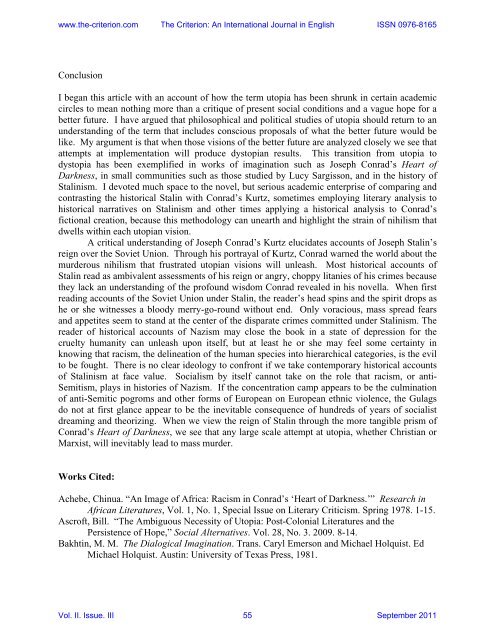Vol. II. Issue. III September 2011 - The Criterion: An International ...
Vol. II. Issue. III September 2011 - The Criterion: An International ...
Vol. II. Issue. III September 2011 - The Criterion: An International ...
Create successful ePaper yourself
Turn your PDF publications into a flip-book with our unique Google optimized e-Paper software.
www.the-criterion.com <strong>The</strong> <strong>Criterion</strong>: <strong>An</strong> <strong>International</strong> Journal in English ISSN 0976-8165<br />
Conclusion<br />
I began this article with an account of how the term utopia has been shrunk in certain academic<br />
circles to mean nothing more than a critique of present social conditions and a vague hope for a<br />
better future. I have argued that philosophical and political studies of utopia should return to an<br />
understanding of the term that includes conscious proposals of what the better future would be<br />
like. My argument is that when those visions of the better future are analyzed closely we see that<br />
attempts at implementation will produce dystopian results. This transition from utopia to<br />
dystopia has been exemplified in works of imagination such as Joseph Conrad’s Heart of<br />
Darkness, in small communities such as those studied by Lucy Sargisson, and in the history of<br />
Stalinism. I devoted much space to the novel, but serious academic enterprise of comparing and<br />
contrasting the historical Stalin with Conrad’s Kurtz, sometimes employing literary analysis to<br />
historical narratives on Stalinism and other times applying a historical analysis to Conrad’s<br />
fictional creation, because this methodology can unearth and highlight the strain of nihilism that<br />
dwells within each utopian vision.<br />
A critical understanding of Joseph Conrad’s Kurtz elucidates accounts of Joseph Stalin’s<br />
reign over the Soviet Union. Through his portrayal of Kurtz, Conrad warned the world about the<br />
murderous nihilism that frustrated utopian visions will unleash. Most historical accounts of<br />
Stalin read as ambivalent assessments of his reign or angry, choppy litanies of his crimes because<br />
they lack an understanding of the profound wisdom Conrad revealed in his novella. When first<br />
reading accounts of the Soviet Union under Stalin, the reader’s head spins and the spirit drops as<br />
he or she witnesses a bloody merry-go-round without end. Only voracious, mass spread fears<br />
and appetites seem to stand at the center of the disparate crimes committed under Stalinism. <strong>The</strong><br />
reader of historical accounts of Nazism may close the book in a state of depression for the<br />
cruelty humanity can unleash upon itself, but at least he or she may feel some certainty in<br />
knowing that racism, the delineation of the human species into hierarchical categories, is the evil<br />
to be fought. <strong>The</strong>re is no clear ideology to confront if we take contemporary historical accounts<br />
of Stalinism at face value. Socialism by itself cannot take on the role that racism, or anti-<br />
Semitism, plays in histories of Nazism. If the concentration camp appears to be the culmination<br />
of anti-Semitic pogroms and other forms of European on European ethnic violence, the Gulags<br />
do not at first glance appear to be the inevitable consequence of hundreds of years of socialist<br />
dreaming and theorizing. When we view the reign of Stalin through the more tangible prism of<br />
Conrad’s Heart of Darkness, we see that any large scale attempt at utopia, whether Christian or<br />
Marxist, will inevitably lead to mass murder.<br />
Works Cited:<br />
Achebe, Chinua. “<strong>An</strong> Image of Africa: Racism in Conrad’s ‘Heart of Darkness.’” Research in<br />
African Literatures, <strong>Vol</strong>. 1, No. 1, Special <strong>Issue</strong> on Literary Criticism. Spring 1978. 1-15.<br />
Ascroft, Bill. “<strong>The</strong> Ambiguous Necessity of Utopia: Post-Colonial Literatures and the<br />
Persistence of Hope,” Social Alternatives. <strong>Vol</strong>. 28, No. 3. 2009. 8-14.<br />
Bakhtin, M. M. <strong>The</strong> Dialogical Imagination. Trans. Caryl Emerson and Michael Holquist. Ed<br />
Michael Holquist. Austin: University of Texas Press, 1981.<br />
<strong>Vol</strong>. <strong>II</strong>. <strong>Issue</strong>. <strong>II</strong>I 55 <strong>September</strong> <strong>2011</strong>
















